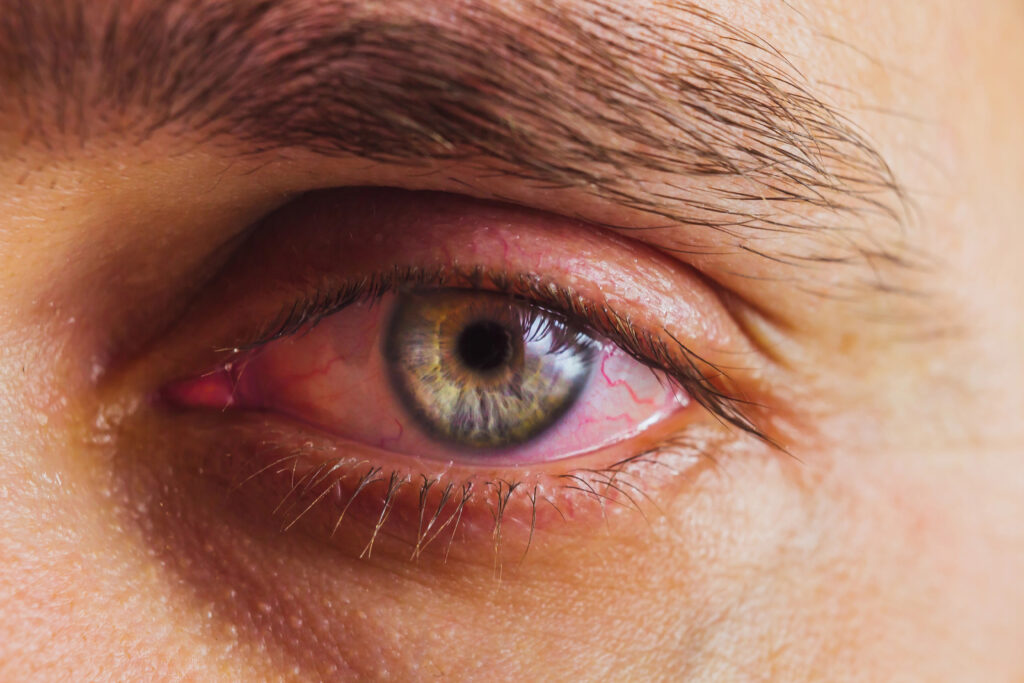Are Sore Eyes Contagious? What You Need to Know

If you’ve ever experienced sore, red, or irritated eyes, you’re not alone. Sore eyes can be caused by a variety of factors, ranging from infections to allergies. One of the most common questions people ask when dealing with this condition is, “Are sore eyes contagious?” The answer depends on the cause. In this article, we’ll break down what causes sore eyes, the symptoms to watch for, and whether or not sore eyes are contagious. With the help of your eye doctor, understanding and treating sore eyes can be simple and effective. Whether it’s a minor irritation or a contagious infection, early treatment can prevent complications and help you get back to seeing clearly. What Causes Sore Eyes? Sore eyes can result from a variety of causes, ranging from mild irritants to serious infections. Understanding the root cause is crucial in determining whether the condition is contagious and how to treat it effectively. Here are some of the most common causes of sore eyes: Viral Infections One of the most frequent causes of contagious sore eyes is viral conjunctivitis, often referred to as pink eye. This type of infection spreads easily through direct contact or contaminated surfaces, making it highly contagious. Bacterial Infections Bacterial conjunctivitis is another contagious form of sore eyes. This infection is typically caused by bacteria entering the eye, often through contact with unclean hands or objects. It’s common in children, and sore eyes treatment for kids often involves antibiotic eye drops. Allergies Non-contagious sore eyes are often caused by allergies. Pollen, dust, pet dander, and other allergens can irritate the eyes, leading to redness, itching, and discomfort. Allergic sore eyes are not contagious, but they can be uncomfortable. Irritants Smoke, pollution, and chemicals can also cause non-contagious sore eyes. Exposure to these irritants can result in redness, dryness, and irritation, but they do not pose a risk of spreading to others. Identifying the cause of sore eyes is the first step in determining whether they’re contagious and finding the right treatment. Your eye doctor can help diagnose the condition and recommend the appropriate treatment for sore eyes. Are Sore Eyes Contagious? The question on everyone’s mind: “Are sore eyes contagious?” The answer depends on the underlying cause. Some forms of sore eyes are highly contagious, while others are not. Contagious Sore Eyes Viral and bacterial conjunctivitis are the most common types of contagious sore eyes. These infections spread easily through direct contact, such as touching your eyes and then touching surfaces or shaking hands. Viral infections like pink eye can be especially contagious, making it important to practice good hygiene and avoid sharing personal items like towels or makeup. Non-Contagious Sore Eyes If your sore eyes are caused by allergies or irritants (such as smoke or dust), they are not contagious. While these forms of sore eyes can cause redness and discomfort, they do not spread to others. Knowing whether your sore eyes are contagious can help you prevent the spread of infection. If you suspect that you have a viral or bacterial infection, it’s important to seek treatment from an eye doctor as soon as possible. Early diagnosis and treatment for sore eyes can prevent the condition from worsening or spreading to others. Symptoms of Contagious vs. Non-Contagious Sore Eyes Understanding the difference in symptoms can help you identify whether your sore eyes are contagious or not. While many symptoms overlap, certain signs can point to a viral or bacterial infection, which could spread to others. Contagious Sore Eyes Symptoms Redness and swelling in the white part of the eye Watery or thick discharge (often yellow or green) Crusting around the eyelids, especially after sleep Itching or burning sensation Increased sensitivity to light Symptoms often begin in one eye and can spread to the other if not treated. Non-Contagious Sore Eyes Symptoms Redness and irritation primarily from allergens or irritants Itchy eyes, often due to allergies Dryness or gritty feeling in the eyes Watery eyes, usually caused by environmental irritants like smoke or dust Symptoms are often present in both eyes simultaneously If you’re experiencing symptoms of contagious sore eyes, it’s important to see an eye doctor for a proper diagnosis and treatment for sore eyes. Early intervention can help prevent the condition from spreading and ease discomfort. How to Prevent the Spread of Sore Eyes If your sore eyes are caused by a contagious infection, such as viral or bacterial conjunctivitis, it’s important to take steps to prevent spreading it to others. Here are some key preventive measures: Wash Your Hands Frequently Wash your hands with soap and water, especially after touching your eyes. This reduces the chances of spreading the infection to surfaces or other people. Avoid Touching Your Eyes Try not to touch or rub your eyes, as this can spread the infection from one eye to the other or to others around you. Don’t Share Personal Items Avoid sharing towels, pillowcases, makeup, or any personal items that come into contact with your face or eyes. This is a common way viral or bacterial infections can spread. Disinfect Surfaces Regularly disinfect commonly touched surfaces such as doorknobs, countertops, and bathroom items to prevent the spread of germs. Stay Home If your sore eyes are contagious, it’s best to avoid going to work, school, or public places until your eye doctor confirms it’s safe to return. Taking these steps can help stop the spread of contagious sore eyes and protect those around you. If you’re unsure whether your sore eyes are contagious, it’s best to consult an eye doctor for proper diagnosis and advice. Treating Sore Eyes: Contagious vs. Non-Contagious The treatment for sore eyes depends on the underlying cause and whether it’s contagious. Here’s how you can manage both types of sore eyes: Treatment for Contagious Sore Eyes Viral Conjunctivitis There’s usually no specific treatment for viral infections like pink eye, as they often clear up on their own within a week or two. However, your eye doctor may recommend lubricating eye

